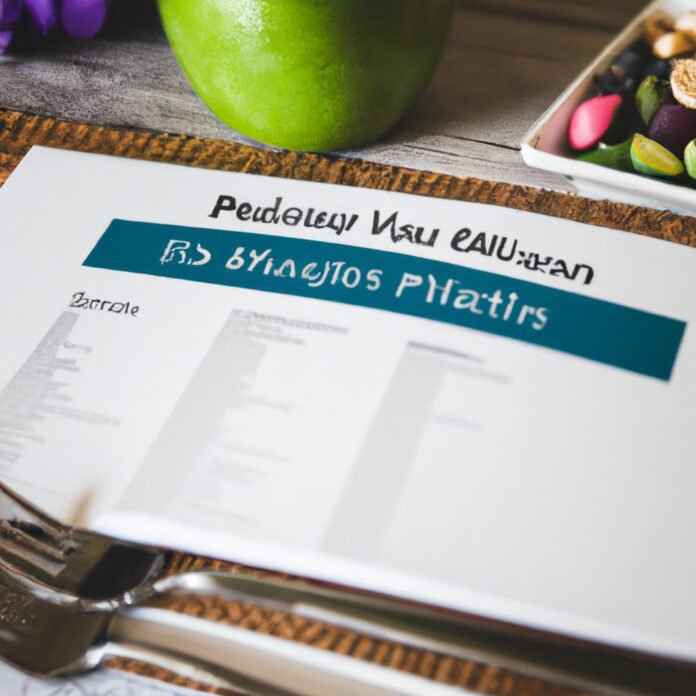Food can be a form of nourishment, and even art! Crafting a diet that fits your needs and lifestyle is a way to bring flavorful creativity into your life while living a healthier lifestyle. Customizing your diet is more than just eating healthy foods; it’s about finding the best nutrition plan for you and your individual needs. Here, we’ll look into the process of customizing your diet and discuss the best nutrition plan for you!
1. Designing a Nutrition Plan to Fit Your Needs
Setting Goals
The first step in is to establish achievable goals. It is important to make sure that these goals are realistic and something that you can actually follow through with. For example, setting a goal to lose ten pounds in two weeks is not realistic. Instead, try setting goals like eliminating unhealthy snacks or eating more fruits and vegetables each day.
Developing Your Plan
Once you have established your personal goals, it is time to hammer out the specifics of your nutrition plan. Start by writing down all of the meals and snacks you plan to have in a typical week. Make sure that your plan involves enough variety and is balanced between all of the food groups. It is also helpful to create a grocery list and plan for which ingredients you need to get each week.
If you’ve never kept to a nutrition plan before, it can be helpful to practice portion control and track your daily intake using a food journal. This is a great way to ensure that you are sticking to your plan and help monitor for any potential nutritional gaps.
Modifying Your Diet
Once you have your nutrition plan developed and have been following it for some time, it is important to stay flexible and make changes where needed. Your body’s needs may change over time, and this could require you to modify your diet. On days when you exercise, make sure to adjust your diet plan accordingly. Additionally, when you should address any changes in your health status and make sure to check in with your doctor to discuss any dietary adjustments that may need to be made.
Hold Yourself Accountable
The last and most important step in creating and maintaining a nutrition plan is to hold yourself accountable for sticking to it. Staying motivated can be difficult, but tracking your progress, setting tangible goals, and even enlisting the help of a support system can be a great way to stay on track and make sure that the nutrition plan you designed fits your needs.
2. Creating a Balanced Diet That Works For You
One of the best ways to maintain a healthy lifestyle is to develop nutrition habits that you can stick with. From calculating your calorie intake to selecting healthy ingredients, involves a bit of effort and ongoing culinary creativity.
A great place to start is by calculating how much energy you need each day. Your energy needs depend on a number of factors, such as age, gender, and physical activity levels. Look up the appropriate number of calories that someone with your profile should have per day, and use that as your daily target.
Fruits and vegetables should be the main part of your diet. Aim for five or more servings of fruits and vegetables each day. Mix it up to get the most possible vitamins and minerals. Then, add whole grains, lean proteins, and low-fat dairy.
Look at the labels when you shop, and remember that not all foods labeled as “healthy” actually are. For example, low-fat packaged snacks can still be high in sodium or have added sugars.
Finally, take time to plan for one or two weekly indulgences! Indulging occasionally, within reason, will help you keep up your healthy eating habits in the long term. Whether it’s a piece of your favorite cake or a small dish of ice cream, don’t forget to give yourself a treat.
3. Exploring The Benefits of Customizing Your Diet
Tailoring your diet to your personal preferences and wants is becoming more popular and accepted, especially in today’s wellness-conscious world. There are many advantages to customizing your diet and here are a few:
- Better Nutrition – By carefully choosing and modifying what you eat, you can ensure that your diet is packed with the essential vitamins and minerals needed to keep you healthy and energized. Specifically, customizing your diet can help you get the proper balance of protein, carbs, fats, and vitamins that your body needs.
- Target the Health Benefits You Want – Everyone has different health goals, and by customizing your diet, you can more accurately target the ones that matter most to you. Whether you’re looking to shed a few pounds, have more energy, or even improve your sleep quality, customizing your diet can help you get there.
- Cater to Personal Tastes – Eating healthy can often be seen as boring and restrictive, but that doesn’t have to be the case! With a customized diet plan, you can create meals that are both delicious and nutritious. So you can still have your favorite dishes while making sure your body is getting the nutrients it needs.
Experimenting and customizing your diet can be a great way to make your meals more enjoyable and ensure you’re getting positive health outcomes from them. If you want to get the most out of your diet plan, take some time to customize it to fit your specific wants and needs.
It’s also worth consulting with a health professional if you’re looking to make drastic changes, as they’ll be able to best guide you on the safest changes you can make for your body.
4. Taking Control of Your Health with a Personalized Meal Plan
We all know that eating well is an important part of staying healthy and eating the right foods is an integral part of enjoying a better quality of life. By creating a personalized meal plan, you can take control of your health and make sure that you’re getting the nutrients you need in order to stay healthy.
Kudos to Planning Ahead
Creating a personalized meal plan doesn’t have to be a daunting task. Start by assessing which nutritional components you’re aiming for with each meal and use this as a base for building your meals. Make sure to include nutritious carbs, protein, and healthy fats in each meal for maximum impact.
- Whole grains like brown rice and quinoa.
- Vegetables like broccoli, kale, and cauliflower.
- Lean proteins like chicken, fish, or eggs.
- Healthy fats like nuts, seeds, and avocados.
You can also get creative with your meals by using herbs and spices to flavor your meals and make them more enjoyable. Research new recipes and experiment with different flavors to keep your meals interesting and flavorful.
Stay on Track
It’s important to stay consistent with your meal plan in order to get the most out of it. Keep a list of the meals and snacks you plan to have in a given week and make sure to prepare them ahead of time or keep them on hand so that you can easily grab them when you need them.
You can also make use of practice self-control by avoiding high-calorie snacks or unhealthy cravings. Try to think of healthier alternatives for satisfying your cravings, or even better, plan healthy snacks ahead of time that you can grab when you’re feeling hungry.
When you customize your diet to fit your nutritional needs, you can take a proactive role in your health. With the right food choices, you can enjoy good health, both physical and mental. So take the time to find the nutrition plan that fits your goals, lifestyle, and budget, and you’ll be on the path to a healthier and happier you.


